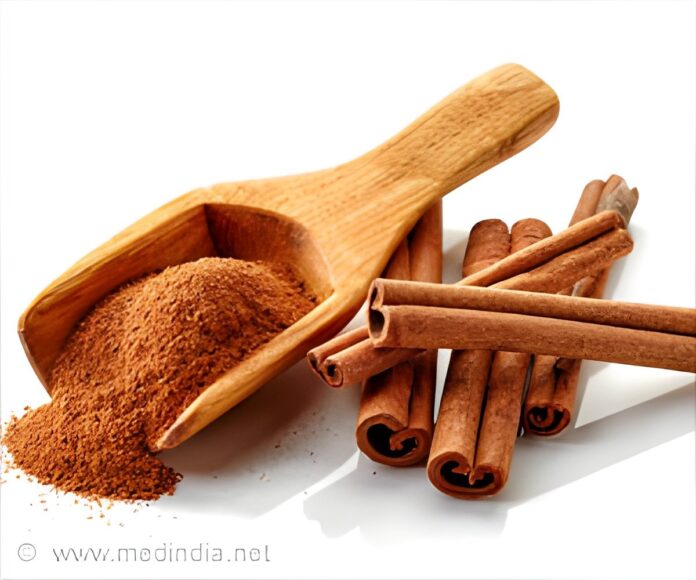Cinnamon supplements may pose health risks by interfering with prescription medications.
- Cinnamaldehyde in cinnamon may activate drug-clearing receptors in the body
- Overuse of supplements can lower the effectiveness of prescription drugs
- Cassia cinnamon, commonly sold in stores, has higher levels of coumarin
Cinnamon is more than just a beloved spice sprinkled on lattes and oatmeal. Long praised for its role in
Evaluation of bioaccessibility, metabolic clearance and interaction with xenobiotic receptors (PXR and AhR) of cinnamaldehyde
Go to source
).
According to a 2024 study by the University of Mississippi’s National Center for Natural Products Research, cinnamaldehyde—the main active compound in cinnamon—may interfere with drug metabolism by activating receptors that clear medications from the body too quickly.
What Is Cinnamaldehyde?
Cinnamaldehyde is the compound responsible for cinnamon’s distinctive flavor and aroma. It also contributes to cinnamon’s antimicrobial, anti-inflammatory, and glucose-lowering properties. These benefits have earned cinnamon a respected place in traditional medicine and modern wellness circles.
But scientists are now paying closer attention to how cinnamaldehyde behaves inside the body—especially when consumed in high concentrations via supplements or essential oils.
100% Bioaccessible—But That’s Not Always a Good Thing
A key finding from the study was that cinnamaldehyde is 100% bioaccessible, meaning the body can fully absorb it in both fasted and fed digestive states. While this high absorption rate sounds promising, it also means cinnamaldehyde can directly interact with metabolic pathways—especially those involved in breaking down drugs.
In liver cell models, cinnamaldehyde and cinnamon oil both inhibited enzymes like CYP2C9 and CYP1A2, which are critical for processing many prescription drugs. They also activated xenobiotic receptors such as PXR and AhR, which regulate the speed at which the body clears foreign substances—including medications.
This could mean your medicine leaves your system too quickly to be effective.
The Hidden Risks of Over-Supplementation
While adding a pinch of cinnamon to your coffee isn’t cause for concern, the same can’t be said for high-dose cinnamon supplements or essential oils.
“Overconsumption of supplements could lead to rapid clearance of prescription medicine, making it less effective,” the researchers caution.
This is especially worrisome for individuals with chronic conditions like diabetes, heart disease, or depression, who often rely on long-term medication use. The risk is even greater when these individuals self-prescribe herbal supplements without informing their healthcare providers.
Not All Cinnamon Is Created Equal
Another layer to this story lies in the type of cinnamon you consume. Most grocery-store cinnamon is Cassia cinnamon, which contains high levels of coumarin, a natural blood thinner that can be hazardous when taken in excess—particularly for those already on anticoagulant medication.
On the other hand, Ceylon cinnamon, often labeled as “true cinnamon,” contains far lower coumarin levels and poses less risk.
Still, regardless of the type, large doses—especially in supplement form—can create conditions for herb-drug interactions that may go unnoticed until a prescription drug starts failing to work.
A Word of Caution for Supplement Users
As the popularity of natural remedies grows, experts urge caution.
“Our best advice is to talk to a healthcare provider before using any supplements along with prescription medicine,” the report advises.
And that advice doesn’t just apply to cinnamon. Many herbal supplements can influence how your body handles medications. Without proper guidance, what starts as a well-intentioned health boost could inadvertently disrupt your treatment plan.
Cinnamon continues to offer promising health benefits, particularly in blood sugar control and heart health. However, high doses—especially in concentrated supplement form—may interfere with how your body processes medications. Until more clinical studies provide clearer answers, it’s best to enjoy cinnamon in moderation and consult your doctor before adding supplements to your routine.
Nature can heal, but when combined with medicine, it must be handled with care—your health depends on the harmony between the two.
Reference:
- Evaluation of bioaccessibility, metabolic clearance and interaction with xenobiotic receptors (PXR and AhR) of cinnamaldehyde
– (https://www.sciencedirect.com/science/article/pii/S2666566224000443?)
Source-Medindia


